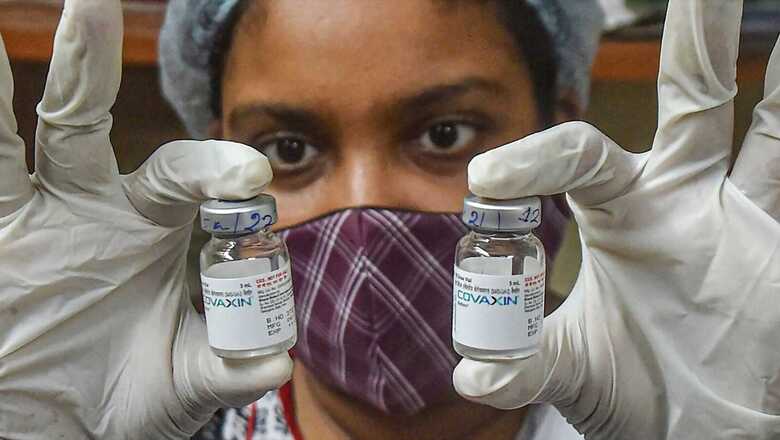
views
A Lancet study based on the first real-world assessment shows two doses of Covaxin are 50 per cent effective against symptomatic Covid-19, opening up a host of questions about India’s indigenous coronavirus vaccine, which has been driving the vaccination coverage in the country.
The results of an interim study recently published in The Lancet showed that two doses of Covaxin, also known as BBV152, had 77.8 per cent efficacy against symptomatic disease and present no serious safety concerns. The latest study assessed 2,714 hospital workers at the All India Institute of Medical Sciences (AIIMS) in Delhi, from April 15-May 15, who were symptomatic and underwent RT-PCR test for COVID-19 detection. Researchers noted that the Delta variant was the dominant strain in India during the study period, accounting for approximately 80 per cent of all confirmed Covid-19 cases.
Here’s the journey of the vaccine and what the latest study means for you:
The make & type
Covaxin is an inactivated whole virus vaccine. According to international vaccine equity partnership Gavi, the science on which Covaxin is based represents “the well-established, and time-tested platform in the world of vaccine technology”. Inactivated whole virus vaccines carry the target pathogen, or some part of it, but with the genetic material destroyed. This means that the virus introduced through the vaccine cannot actually replicate inside the body, although it is good enough to prompt the immune system into building a defence against it.
What is the efficacy?
Announcing the final results of its Phase-III clinical trials in July this year, Bharat Biotech said that the vaccine — which it has developed in collaboration with the Indian Council of Medical Research (ICMR)-National Institute of Virology (NIV) — has an effectiveness rate of 77.8 per cent against symptomatic Covid-19, which went up to 93.4 per cent against severe symptomatic infection.
However, the latest findings suggest the vaccine is less effective than initially thought. While studies show that most vaccines have reduced efficacy against the Delta variant, which is highly transmissible, the latest Covaxin data may dent its appeal at a time when Bharat Biotech is ramping up production and India starts sending shipments of the vaccine globally.
Any limitations of the lancet study?
The authors acknowledged that the vaccine effectiveness of Covaxin estimated in the study is lower than the efficacy reported by the recently published phase 3 trial. They noted that several factors may be responsible for the lower vaccine effectiveness in the latest study. The researchers said this study population only included hospital employees who may have a higher risk of exposure to Covid-19 infection than the general population.
The research was conducted during the peak of India’s second wave of Covid-19 with high test positivity rates for both hospital employees and residents of Delhi, they said. Prevalence of circulating variants of concern, especially Delta, may have also contributed to the vaccine’s lower effectiveness, according to the researchers.
The authors acknowledge several limitations to their study. The study does not estimate the vaccine effectiveness against hospitalisation, severe disease, and death, which require further assessment, they noted.
Also, the study was not designed to estimate vaccine effectiveness for different time intervals after vaccination or to determine if vaccine effectiveness changed over time, the researchers added.
so, is the vaccine safe for you?
The Covid-19 vaccine made by Bharat Biotech is ‘highly efficacious’ and presents no safety concern, another study by The Lancet had said earlier. Covaxin “induces a robust antibody response” two weeks after two doses are given, The Lancet said in a statement. No severe-vaccine-related deaths or adverse events were recorded during a randomised trial involving 24,419 participants aged 18-97 years between November 2020 and May 2021 in India, the medical journal added.
What does the WHO nod to Covaxin mean?
Covaxin becomes the seventh vaccine to receive WHO’s emergency use listing (EUL) — the vaccines made by Pfizer-BioNTech, Moderna, Johnson & Johnson, Oxford-AstraZeneca and the Chinese-made Sinopharm and Sinovac shots being the other ones — with the global health body saying in a tweet that it adds “to a growing portfolio of vaccines validated by WHO for the prevention of #COVID19″.
Bharat Biotech says Covaxin “has been specifically designed to meet the needs of global distribution chains, the requirements for which are more critical in low- and middle-income countries”. It can be kept under normal refrigeration at temperatures of between 2-8 degrees Celsius and has been “formulated to adhere to a multi-dose vial policy, thereby reducing open vial wastage”.
The vaccine also received a recommendation for use among the 2 to 18 years age group and is awaiting the regulatory nod for rollout among children in India. Bharat Biotech had said that it was also working on assessing the safety and immunogenicity of a Covaxin booster dose.
Read all the Latest India News here



















Comments
0 comment